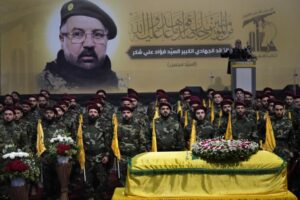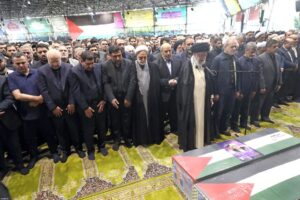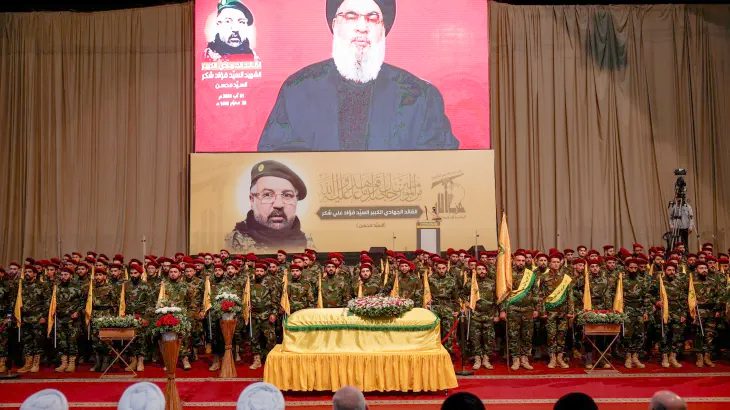On Thursday, Hezbollah’s leader Sayyed Hassan Nasrallah warned that the conflict with Israel has entered a “new phase,” as he addressed mourners at the funeral of a commander from the group who was killed by an Israeli airstrike this week in Beirut.
Meanwhile in Tehran, Iran’s supreme leader Sayyed Ali Khamenei prayed over the body of Hamas’ political leader, who was killed in a presumed Israeli assassination.
The back-to-back killings have increased fears of an escalation into a wider war, leaving the region waiting to see how Iran and ally Hezbollah will respond. Iran has vowed retaliation against Israel for the strike that killed Hamas’ Ismail Haniyeh on Wednesday in the Iranian capital of Tehran.
Israel has not claimed responsibility for Haniyeh’s assassination, but comments by Israeli military spokesman Rear Adm. Daniel Hagari stopped short of an outright denial.
“There was no additional airstrike, not a missile and not an Israeli drone, in the entire Middle East that night,” he said Thursday, fueling speculation that Israel could have used other means to kill Haniyeh.
However, Israel did confirm it carried out the strike Tuesday in the Southern suburb of Beirut that killed Hezbollah commander Fouad Shukur, along with an Iranian military adviser and at least five civilians — including three women and two children — and injured more than 74 others, some in critical conditions, according to Lebanese government health officials. Israel said Shukur was behind a rocket attack days earlier that hit a soccer field in the Israeli-occupied Golan Heights, killing 12 children. Hezbollah denied being behind that strike, a denial that Nasrallah reiterated in his speech on Thursday.
In a speech via video link to mourners gathered with Shukur’s coffin at an auditorium in a Beirut suburb, Nasrallah said, “We … have entered a new phase that is different from the previous period.”
“Do they expect that Hajj Ismail Haniyeh will be killed in Iran and Iran will remain silent?” he said of the Israelis who were celebrating the killing of Hamas leader. Addressing Israelis who celebrated the two killings, Nasrallah said, “Laugh a bit now because you will be crying a lot later.”
Nasrallah vowed a “very well-studied retaliation” without saying what form it would take and when it will happen. He said only that Israel “will have to wait for the anger of the region’s honorable people.”
“The enemy and the one who is behind the enemy” — an apparent reference to Israel’s chief ally, the United States — “will have to wait for our coming response,” he said.
Since the Gaza war began in October, Hezbollah and Israel have traded fire almost daily across the border in exchanges that have caused deaths and the evacuation of tens of thousands from their homes. But they have also stayed within limits. International mediators have been scrambling to avert a cycle of retaliation before it spirals into a greater war.
Several times, strikes that appeared to cross red lines raised fears of an acceleration into full-fledged war, but outside diplomacy reined in the two sides. Hezbollah faces strong pressure not to draw Lebanon into a repeat of the 2006 war with Israel, which wreaked heavy death and destruction in the country.
Israel and Iran risked plunging into war earlier this year when Israel hit Iran’s embassy in Damascus in April. Iran retaliated and Israel countered in an unprecedented exchange of strikes on each other’s soil, but international efforts succeeded in containing that cycle before it spun out of control.
In his speech, Nasrallah praised Shukur as a veteran commander and denied that Hezbollah carried out the deadly strike on the soccer field in the mainly Druze town of Majdal Shams in the Golan Heights.

Hezbollah top commander Fouad Shukur
“We have the courage to take responsibility for where we strike, even if it’s a mistake. If we made a mistake, we would admit and apologize,” he said, adding, “The enemy made itself the judge, jury and executioner without any evidence.”
Nasrallah also said that the American officials and Western media and the media in some Arab countries believed Israel’s lies without any questions.
An unusual relative calm prevailed Thursday on the Lebanon-Israel border. Hezbollah claimed no rocket launches into Israel during the day. The Lebanese state news agency said a strike hit the house of a Syrian family in a southern Lebanese town, killing at least four people and wounding several others. Afterward, Hezbollah announced it had launched a barrage of rockets into Israel in retaliation.
Nasrallah said Hezbollah’s fighters would return to regular military operations Friday, ending the period of mourning for Shukur, but that the renewed strikes would be unrelated to the retaliation for his killing.
Earlier Thursday in Tehran, Iranian supreme leader Ayatollah Ali Khamenei prayed over Haniyeh’s coffin in a ceremony at Tehran University, with the new president, Masoud Pezeshkian, next to him. State television later showed the coffin placed in a truck and moved on the street toward Azadi Square in Tehran and people throwing flowers at it.
Haniyeh’s remains are to be transferred to Qatar for burial Friday.
Haniyeh came to Tehran to attend the inauguration of Pezeshkian. Associated Press photos showed the Hamas leader seated alongside leaders from the Palestinian Islamic Jihad militant group and Hezbollah, and Iranian media showed him and Pezeshkian hugging. Haniyeh had met earlier with Khamenei.
Hours later, he was killed in a strike that hit a residence Haniyeh uses in Tehran. Iranian authorities said the attack is under investigation, but haven’t provided details.
Israel had pledged to kill Haniyeh and other Hamas leaders over the group’s Oct. 7 attack on southern Israel that sparked the war in Gaza. On Thursday, Israel said it had confirmed that the head of Hamas’ military wing, Mohammed Deif, was killed in a July 13 airstrike in Gaza. Hamas, which earlier said Deif survived the blast, did not immediately comment.

Iran Supreme Leader Sayyed Ali Khamenei leads prayers at Haniyeh’s funeral – Photo by AnadoluIran Supreme Leader Sayyed Ali Khamenei leads prayers at Haniyeh’s funeral – Photo by Anadolu
NYT: Hamas leader Haniyeh was killed by a bomb hidden in his guest house
Late Thursday the New York Times reported that Haniyeh was killed by a bomb planted in a guest house where he was staying in Tehran. It was secretly brought to the territory of the complex two months ago.
The New York Times writes about this with reference to sources.
The guest house is run by the Islamic Revolutionary Guard Corps (IRGC), and is part of the large Neshat complex in an elite area of northern Tehran. There is increased security.
According to the newspaperʼs sources, the leader of the Hamas political office in Qatar stayed at this guest house several times during his visits to Tehran.
Ismail Haniyeh was in his room when the bomb was detonated remotely. Both he and his bodyguard died. Due to the explosion, the windows were blown out, the outer wall collapsed.
In the hours after the explosion, there were speculations that Israel had killed Haniya with a missile strike or a drone strike. However, such a theory raised questions about how Israel could avoid Iranʼs air defense systems.
However, for the murder, the perpetrators took advantage of another gap in Iranʼs defense — a failure in the security of the complex in which the bomb was planted. It remained unnoticed for many weeks. Exactly how it was carried and laid is unknown.
Iranian officials, speaking on condition of anonymity, said it was a catastrophic failure for Iranʼs intelligence and security forces and a major embarrassment for IRGC guards, who use the complex for secret meetings and to host important guests such as Haniyeh.






Leave a Reply